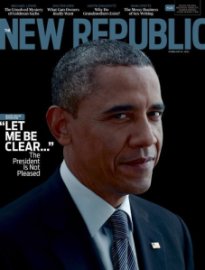I don’t have much to offer on the meltdown of The New Republic except for a few inchoate thoughts. Many people have written many things, but it seems to me that the one essential read is Lloyd Grove’s piece in The Daily Beast. Now then:
1. Despite owner Chris Hughes’ excruciatingly awful behavior last week, it still isn’t clear to me why everyone resigned. When then-owner Marty Peretz fired editor Michael Kelly in 1997, mass resignations were threatened, but only one writer — media columnist William Powers — actually walked out the door. Kelly was an enormously popular, charismatic figure, but maybe the lack of solidarity was in recognition of how far he had dragged the supposedly liberal magazine to the right. Still, does no one want to see if there might be some positive aspects to Hughes’ plan?
2. And yet — if Hughes wants a digital media startup, why didn’t he just do it instead of buying TNR and turning it into something else? That makes no sense. And yet again — if Hughes is looking for the kind of print/online/events strategy that has transformed The Atlantic, as media-business analyst Ken Doctor argues, how could that possibly be a bad thing? I’d be the first to admit that I don’t like The Atlantic nearly as much as I did when it was a staid, Boston-based monthly. But it has managed to combine success, influence and seriousness, and that’s nothing to be scoffed at.
3. During Peretz’s long ownership, TNR was derided not just for its lack of diversity but for its hostility to any steps aimed at ensuring racial justice. I wrote for TNR twice. The first time, in 1998, was about the departure of Boston Globe columnists Patricia Smith and Mike Barnicle for fabricating, and Barnicle for plagiarizing as well. When I received the edited version of my piece, I saw that someone had inserted some harsh anti-affirmative action language. (The idea was that both Smith, an African-American, and Barnicle, an Irish-American, had been beneficiaries of some sort of affirmative-action mindset.) I was appalled, and fortunately was able to get the language removed before publication. But it showed what kind of thinking prevailed at TNR.
4. Among the former TNR editors lashing out at Hughes is Andrew Sullivan, who, among other things, once gave over the cover of the magazine to the authors of “The Bell Curve,” a racist tome that argued that black people just aren’t as intelligent as whites. Sullivan also published an infamous, falsehood-filled article by Betsy McCaughey that trashed the Clinton health plan and may have contributed to its defeat. Sullivan did far more harm to TNR than Hughes, but now he’s seen as a defender of tradition. (For more on the sins of TNR during the Peretz era, see Charlie Pierce.)
5. Probably the worst thing you can say about Hughes is that he decided to blow up The New Republic just as it was rediscovering its footing as a liberal journal. Editor Franklin Foer, by all accounts, was doing a fine job before Hughes fired him. But what is the role of a magazine like TNR in the digital age? The policy pieces in which it specialized are everywhere. Hughes could have kept it going as a small, money-losing journal, of course. But there was a time when TNR was an influential small, money-losing journal. Those days are long gone, as Ezra Klein notes at Vox. You can’t blame Hughes for wanting to try something different. If his behavior had been less reprehensible, maybe he could have brought his talented staff and contributors along for the ride.
